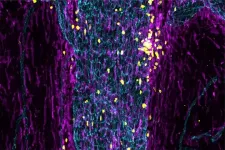Important climate change mystery solved by scientists
Revised Holocene temperature record affirms role of greenhouse gases in recent millennia
2021-01-27
(Press-News.org) Scientists have resolved a key climate change mystery, showing that the annual global temperature today is the warmest of the past 10,000 years - contrary to recent research, according to a Rutgers-led study in the journal Nature.
The long-standing mystery is called the "Holocene temperature conundrum," with some skeptics contending that climate model predictions of future warming must be wrong. The scientists say their findings will challenge long-held views on the temperature history in the Holocene era, which began about 12,000 years ago.
"Our reconstruction shows that the first half of the Holocene was colder than in industrial times due to the cooling effects of remnant ice sheets from the previous glacial period - contrary to previous reconstructions of global temperatures," said lead author Samantha Bova, a postdoctoral researcher associate in the lab of co-author Yair Rosenthal, a Distinguished Professor in the Department of Marine and Coastal Sciences and Department of Earth and Planetary Sciences at Rutgers University-New Brunswick. "The late Holocene warming was indeed caused by the increase in greenhouse gases, as predicted by climate models, and that eliminates any doubts about the key role of carbon dioxide in global warming."
Scientists used marine calcareous (calcium carbonate-containing) fossils from foraminifers - single-celled organisms that live at the ocean surface - to reconstruct the temperature histories of the two most recent warm intervals on Earth. They are the Last Interglacial period from 128,000 to 115,000 years ago and the Holocene. To get the fossils, the scientists collected a core of bottom sediments near the mouth of the Sepik River off northern Papua New Guinea during the Rutgers-led Expedition 363 of the International Ocean Discovery Program. The core features rapidly accumulating sediments that allowed the scientists to recreate the temperature history of the western Pacific warm pool, which closely tracks changes in global temperatures.
How temperature evolved during the Last Interglacial and Holocene eras is controversial. Some data suggest that the average annual global temperature during modern times does not exceed the warmth in the Holocene's early warm period, called the "Holocene thermal maximum," which was followed by global cooling. Meanwhile, climate models strongly suggest that global temperatures have risen throughout the past 10,000 years.
"The apparent discrepancy between climate models and data has cast doubts among skeptics about the role of greenhouse gases in climate change during the Holocene and possibly in the future," Rosenthal said. "We found that post-industrial warming has indeed accelerated the long and steady trend of warming throughout the past 10,000 years. Our study also underscores the importance of seasonal changes, specifically Northern Hemisphere summers, in driving many climate systems. Our method can, for the first time, use seasonal temperatures to come up with annual averages."
INFORMATION:
Rutgers-affiliated co-authors include Shital P. Godad, a former Rutgers researcher now at National Taiwan University. Scientists at The Ohio State University and Nanjing Normal University contributed to the study.
[Attachments] See images for this press release:

ELSE PRESS RELEASES FROM THIS DATE:
2021-01-27
STOCKHOLM: With impacts from climate change threatening to be as abrupt and far-reaching in the coming years as the current pandemic, leading scientists have released a compilation of the 10 most important insights on the climate from the last year to help inform collective action on the ongoing climate crisis.
In a report presented today to Patricia Espinosa, Executive Secretary of the United Nations Framework Convention on Climate Change (UNFCCC), report authors outlined some of 2020's most important findings within the field of climate science, ranging from improved models that reveal the need for aggressive emission cuts in order to meet the Paris Agreement to the growing use of human rights litigation to catalyze climate action.
The report alleviates some worries that ...
2021-01-27
In experiments at the Paul Scherrer Institute PSI, an international research collaboration has measured the radius of the atomic nucleus of helium five times more precisely than ever before. With the aid of the new value, fundamental physical theories can be tested and natural constants can be determined even more precisely. For their measurements, the researchers needed muons - these particles are similar to electrons but are around 200 times heavier. PSI is the only research site in the world where enough so-called low-energy muons are produced for such experiments. The researchers are publishing their results today in the journal Nature.
After hydrogen, helium is the second most abundant element in the universe. Around one-fourth of the ...
2021-01-27
People with schizophrenia, a mental disorder that affects mood and perception of reality, are almost three times more likely to die from the coronavirus than those without the psychiatric illness, a new study shows. Their higher risk, the investigators say, cannot be explained by other factors that often accompany serious mental health disorders, such as higher rates of heart disease, diabetes, and smoking.
Led by researchers at NYU Grossman School of Medicine, the investigation showed that schizophrenia is by far the biggest risk factor (2.7 times increased odds of dying) after ...
2021-01-27
The inner ear of a 400 million-year-old 'platypus fish' has yielded new insights into early vertebrate evolution, suggesting this ancient creature may be more closely related to modern-day sharks and bony fish than previously thought.
A team of scientists from the University of Birmingham in the UK, and institutions in China, Australia and Sweden, used 'virtual anatomy' techniques, including MicroCT scanning (using x-rays to look inside the fossil) and digital reconstruction to examine previously unseen areas within the braincase of these mysterious fossils.
They discovered the fish, called ...
2021-01-27
BOSTON -- For the first time, scientists have identified the individual neurons critical to human social reasoning, a cognitive process that requires us to acknowledge and predict others' hidden beliefs and thoughts. A team of neuroscientists at Massachusetts General Hospital (MGH) and Massachusetts Institute of Technology (MIT) had a rare look at how individual neurons represent the beliefs of others by recording neuron activity in patients undergoing neurosurgery to alleviate symptoms of motor disorders such as Parkinson's disease. Their findings are published in Nature.
The researchers were studying a very complex social cognitive ...
2021-01-27
What The Study Did: This study among patients in Italy suggests that despite virological recovery, a sizable proportion of patients with COVID-19 experienced respiratory, functional or psychological conditions months after hospital discharge.
Authors: Mattia Bellan, M.D., Ph.D., of Università del Piemonte Orientale in Novara, Italy, is the corresponding author.
To access the embargoed study: Visit our For The Media website at this link https://media.jamanetwork.com/
(doi:10.1001/jamanetworkopen.2020.36142)
Editor's ...
2021-01-27
What The Study Did: In this observational study of about 7,300 adults with laboratory-confirmed COVID-19 in a New York health system, a schizophrenia spectrum diagnosis was associated with an increased risk of death after adjusting for demographic and medical risk factors. Mood and anxiety disorders weren't associated with increased risk of mortality.
Authors: Donald C. Goff, M.D., of New York University Langone Medical Center in New York, is the corresponding author.
To access the embargoed study: Visit our For The Media website at this link https://media.jamanetwork.com/
(doi:10.1001/jamapsychiatry.2020.4442)
Editor's Note: The article includes conflict of interest disclosures. Please see ...
2021-01-27
What The Study Did: Researchers evaluated the association between the pandemic and clinical research and development by studying the initiation of oncology clinical trials over time.
Authors: Elizabeth B. Lamont, M.D., M.S., M.MSc., of Acorn AI by Medidata, a Dassault Systèmes Company, in Boston, is the corresponding author.
To access the embargoed study: Visit our For The Media website at this link https://media.jamanetwork.com/
(doi:10.1001/jamanetworkopen.2020.36353)
Editor's Note: The article includes conflict of interest disclosures. Please see the article for additional information, including other authors, author contributions and affiliations, conflict of interest and financial ...
2021-01-27
New findings on the brain and inner ear cavity of a 400-million-year-old platypus-like fish cast light on the evolution of modern jawed vertebrates, according to a study led by Dr. ZHU Youan and Dr. LU Jing from the Institute of Vertebrate Paleontology and Paleoanthropology (IVPP) of the Chinese Academy of Sciences.
The study was published in Current Biology on Jan 27.
Back in 1960s, Paleontologist Dr. Gavin C. Young found several fossils of a long-beaked fish, a type of placoderm, in the Burrinjuck limestones in Australia. He named the fish Brindabellaspis stensioi, and other people jokingly dubbed it "platypus fish" because of its long ...
2021-01-27
Alzheimer's disease, multiple sclerosis, autism, schizophrenia and many other neurological and psychiatric conditions have been linked to inflammation in the brain. There's growing evidence that immune cells and molecules play a key role in normal brain development and function as well. But at the core of the burgeoning field of neuroimmunology lies a mystery: How does the immune system even know what's happening in the brain? Generations of students have been taught that the brain is immunoprivileged, meaning the immune system largely steers clear of it.
Now, researchers at Washington University School of Medicine in St. Louis believe they have figured out how the immune system keeps tabs on what's going on in the brain. Immune ...
LAST 30 PRESS RELEASES:
[Press-News.org] Important climate change mystery solved by scientists
Revised Holocene temperature record affirms role of greenhouse gases in recent millennia


